Ukraine is preparing for negotiations with the Russian Federation? What do Ukrainians think about it?
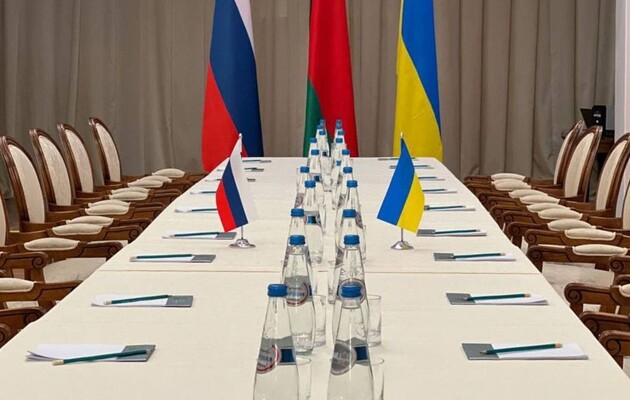
"Arms in Exchange for Peace". It looks like this sad oxymoron has a great chance of becoming our not-so-distant reality...
After the partners of Ukraine incredibly delayed (and continue to delay) the supply of critically needed weapons to Ukraine; they did not provide our army, if not with an advantage over Russia, then at least with parity in the air during the “decisive offensive”. Speaking about the Western media, for half a year they systematically increased the degree of expectations from this offensive, now the same media are no less systematically provoking disappointment and writing about the “too slow” pace of this offensive, “modest successes” and “big losses” that Ukraine is suffering.
Against this background, in recent weeks, the word “negotiations” has been heard more and more often. And not only from the possible next president of the United States of America, Donald Trump, who believes that “the time has come for the United States of America to try to negotiate a peaceful settlement through negotiations between Russia and Ukraine.” This word is heard not only from the Hungarian Prime Minister Viktor Orban, who has long called on Ukraine to sit down at the negotiating table with Russia, or the Bulgarian President Rumen Radev, who recently told Volodymyr Zelenskyy about the need to “search for peaceful solutions through diplomacy”.
Even our close friends started talking about possible negotiations. Thus, Czech President Petr Pavel, with the frankness of a NATO general, said on the first day of the Alliance summit that Ukraine's window of opportunity for military progress "will more or less close by the end of this year." In addition, he noted that everything that will be achieved by that time "will be the starting point for negotiations." And before that, Polish President Andrzej Duda expressed Poland's readiness for peacekeeping, "if Ukraine decides to hold peace talks with Russia and a decision is made to conduct a peacekeeping operation with the participation of Western soldiers."
For the time being, official Washington publicly repeats the previous thesis that Ukraine itself will decide when it should sit down at the negotiating table with Russia, however, on the sidelines, apparently, the basis for this decision is already being actively prepared. And the recent publication by The Washington Post about an unpublished June visit to Kyiv by the Central Intelligence Agency (CIA) Director William Burns, during which the Ukrainian authorities allegedly revealed to him their ambitious plans, including regarding the start of negotiations with the Russian Federation at the end of this year, confirms this. It is worth noting that it is not known exactly who told whom more about future negotiations. However, it is already clear that "negotiations about negotiations" have been going on for a long time – at different levels (not the highest yet) and between different players. The Americans assess the situation not only in Kyiv. A leak that appeared last week in NBC News and was later confirmed by White House officials revealed details of unofficial secret talks in April between a group of former senior officials of the United States of America and Russia (including Foreign Minister of Russia Sergei Lavrov). This leak points to ongoing "high-level behind-the-scenes diplomacy." There is reason to believe that Ukrainians, when meeting with Russians, are also discussing not only about the exchange of prisoners. And the geography of platforms for discussion is quite wide, namely from Turkey and the Emirates to Israel.
About the ceasefire negotiations
Despite the fact that President Zelenskyy did not get tired of repeating almost daily that Kyiv is not even ready to even think about any negotiations until Putin withdraws his troops from Ukraine, we nevertheless decided to ask what our fellow citizens think about this.
According to the results of a sociological survey conducted by the Razumkov Center commissioned by ZN.UA, a total of 86.6% of respondents believe that negotiations on a cessation of hostilities cannot begin before the results of the Ukrainian counteroffensive. A total of 76.8% of people do not want negotiations to begin even after it. Only 9.8% of respondents agree that this can happen after the offensive. Another 9.6% of people believe that ceasefire negotiations should take place after the Ukrainian Armed Forces reach the demarcation line as of February 23, 2022. Talking to the aggressor only after the restoration of Ukraine's sovereignty over all territories as of 1991 is supported by 28.4% of our fellow citizens. (Fig. 1)
And 38.8% of Ukrainians are generally sure that such negotiations are not needed. Moreover, this is the most popular answer in all regions of the country. However, our fellow citizens in the West turned out to be the most categorical, where more than half (53.3%) are against negotiations with the aggressor. In second place with 37.1% is the long-suffering South of Ukraine, part of which is still under occupation, and the reasons for such a number of its inhabitants to want the Armed Forces of Ukraine to drive the enemy out of Ukraine without any negotiations are quite understandable. It is worth noting that 33.6% of respondents in the East have the same reasons. People in this territory "enjoy" the deadly fruits of the "Russian world" longer than other regions. However, in the Center, almost a third of Ukrainians (32.6%) are against negotiations with the Russian Federation on a ceasefire.
About "attacks" on Russia
After the significant events in the “Belgorod People's Republic”, we could not help but wonder if the Ukrainians support the conduct of hostilities on the territory of Russia?
It should be noted that 63.4% of respondents answered “yes”. Only 16.4% of respondents at the same time allow the participation of the Armed Forces of Ukraine in these hostilities. The remaining 47% of Ukrainians support battles on enemy territory only if they are fought by Russian citizens who oppose the Putin regime. Every fifth (21.9%) Ukrainian is against hostilities on the territory of the Russian Federation. (Fig. 2)
I don't know whether such results will reassure our partners in Washington. But judging by the signals passed to Kyiv in a news magazine Newsweek publication last week, Ukrainian "pranks" abroad are not only annoying, but also seriously disturbing our main ally in the fight against Russia.
“Biden decided that the United States of America (and Kyiv) would not take any action that could threaten Russia itself or the survival of the Russian state unless Putin escalated the conflict and dragged all of Europe into another world war.” The publication writes about this after talking with more than a dozen high-ranking the Central Intelligence Agency (CIA) officers and officials of the current American administration. In addition, in this way, the publication recalls that three months before the start of large-scale aggression, Burns visited Moscow, and although Putin did not meet with him personally and defiantly spoke with the head of the Central Intelligence Agency (CIA) from the city of Sochi on the phone, the conversation turned out to be successful, that is, the parties adopted the "rules of the road ". According to the agreement, the United States of America will not fight directly with Russia and seek regime change.
“Zelenskyy openly stated that Ukraine would not attack Russia,” the publication recalls several times, though forgetting to clarify just as many times that it was only about the non-use of American weapons.
Nevertheless, officials in Washington are very dissatisfied: strikes on the Crimean bridge, a military airfield in the city of Engels, a drone attack on the Kremlin and a military operation in the Belgorod region caused serious displeasure in Washington. No matter how much officials in Kyiv deny its involvement in these operations, and the Russian Volunteer Corps (RVC) and the Freedom of Russia Legion (FRL) take responsibility, there is no trust in them. The Central Intelligence Agency (CIA) had no prior knowledge of any of these attacks, according to Newsweek sources. “Sabotage attacks and cross-border fighting have created an entirely new complication and continued Ukrainian sabotage could be disastrous,” a senior military intelligence official said.
Therefore, we can well assume that William Burns, who visited Ukraine shortly before Prigozhin’s rebellion and knew about its preparation, came to Kyiv not only in order, according to the published version, “to confirm the commitment of the administration of the President of the United States of America Joe Biden to the exchange of intelligence data that will help Ukraine defend itself.” ". And although the sources of the publication were "encrypted", claiming that the data available about the impending rebellion "were not discussed during meetings with Zelenskyy and other Ukrainian officials", it is hard to believe that the transmission of a clear signal to the Ukrainians, which sounds like "do not dare to get into all this! » was not one of the main purposes of this visit. (Well, and familiarization with the "ambitious plan of Kyiv" for "negotiations by the end of the year", of course, too.). At the end of Prigozhin’s barely begun “march of justice,” the Biden administration, with a clear conscience, was able to assure the Kremlin about twenty times that Washington and Kyiv had nothing to do with Wagner’s campaign against Moscow.
On the sidelines, according to Newsweek, Washington has also had to persuade dozens of countries to accept "the Biden administration's restrictions," though some of those states, including the United Kingdom of Great Britain and Poland, "willing to take more risks than officials in the White House are willing to take.
About possible intermediaries
The number of countries and organizations that have declared their desire to become mediators between Ukraine and Russia has already exceeded the second dozen. And who do Ukrainians themselves want to see in this role?
Even those inexperienced in big politics and secret diplomacy, our fellow citizens are aware of whom they can rely on in the first place. Answering the question of ZN.UA, which country they would like to see as a mediator in the negotiations between Ukraine and Russia (several answers could be chosen), the respondents of our social survey, with all the variety of choices, gave the second and third places to the United Kingdom of Great Britain (32.7%) and Poland (25.7%) (Fig. 3). It is these two countries that have earned the great confidence of Ukrainians by their enthusiasm and determination in defending the interests of our country and “pushing through” the decisions we need on various international platforms. Unconditional leadership in this rating as the most authoritative side is occupied by the United States of America, which 43.7% of respondents see as a mediator at the table of Ukrainian-Russian negotiations, I think it is completely understandable.
The well-deserved fourth place was taken by the European Union (EU): its mediation in negotiations with the Russian Federation is welcomed by every fourth respondent (24.9%). This result is both a tribute to the assistance provided by the European Union (EU) to Ukraine after February 24, 2022 (both military, financial, and sanctions), and evidence of confidence in the organization, which took a risk and decided to grant Ukraine candidate status at the most difficult time for it. And, according to our European sources, it is likely that the decision to start negotiations on Ukraine's membership will be made by the European Union (EU) before the end of this year.
To be honest, it is quite surprising that under these circumstances, the United Nations (UN) received only half as many votes as EU – 12.8%. An organization whose Security Council can be headed by a state that has not only violated its own charter and all the basic tenets of international and humanitarian law, but also daily violates the main commandment of most religions of the world – “do not kill”. Thus, such a helpless structure does not deserve not only mediation in the most terrible war in Europe for the entire existence of the Organization, but also its very existence.
And we will not remember the role of the Organization for Security and Co-operation in Europe (OSCE) at all and we will better keep silent. Has anyone heard at least something about the actions or at least attempts of this organization to pacify the aggressor and return to Europe both security and cooperation? It should be noted that 5.4% of our respondents who named this organization most likely paid tribute to its former merits. Moreover, quite a long-standing merit, because the mediation of the Organization for Security and Co-operation in Europe (OSCE) in the "Minsk process" for more than seven years has left, to put it mildly, a very unpleasant memory.
By the way, returning to the European Union (EU), let us recall that formally it was already a mediator in the Ukrainian-Russian negotiations, delegating powers to Germany and France in the Normandy format. It is worth noting that this is also not the best experience. But it is curious that almost a year and a half after the start of a full-scale war, Ukrainians assess the mediating potential of Berlin and Paris in different ways. And although the idea of Normandy was born in France, today, when Germany has become the second supplier of weapons to Ukraine after the United States of America, our fellow citizens clearly prefer this particular country. It should be noted that there are almost twice as many supporters of German intermediary services than French ones (14.6 vs. 7.4%). However, Berlin itself, as our German sources testify, is fed up with previous experience and no longer wants to act as a mediator, even if peace negotiations between Ukraine and Russia ever resume in one format or another.
Unlike Germany, many of the names on our list of potential intermediaries are striving to take this place. However, they do not find support among the Ukrainians. So, even the "champions" among the most active contenders, namely China and Turkey – received only 8.7 and 6.7% of the vote, respectively. Ukrainians were not impressed by either Beijing's formal "peace plan" or Erdogan's peacekeeping hyperactivity, behind which are seen both self-serving geopolitical motives and a banal desire for profitable deals with Russia.
ZN.UA has repeatedly written about the peacekeeping efforts of the representatives of the Vatican, which has no influence either in Ukraine or in Russia. Whether they really had a peace plan, or only good intentions, remained a mystery. However, the Pope has become more modest, and among the respondents of our opinion poll, only 2.1% would like to see him as a mediator in the Ukrainian-Russian negotiations.
We can name three more "peacemakers-initiators" – Brazil, Indonesia and the Republic of South Africa, in whose proposals the interests of the Russian Federation are clearly involved. These countries received a percentage of votes less than the statistical error. And 14.7% of the polled Ukrainians generally believe that Ukraine does not need any mediators at all in negotiations with Russia.
But we are unlikely to be able to do without them. And by placing the United States of America in the first place in our rating, by a wide margin from all other potential mediators, the Ukrainians also showed our main partner gratitude for the unprecedented assistance during the war. In addition, our country has thus shown confidence and desperate hope that the mediation of the world's most powerful geopolitical player will be successful. At least more successful than the amendments spelled out in the notorious Normandy format.
But are these hopes justified? Do we see success in the same way as the Americans? Do they believe in our victory? Do they want it? Did you pay attention to their wording? The other day, commenting on the provision of cluster munitions to Ukraine, the White House spokesman John Kirby again repeated the phrase, verified in high Washington offices: they will help Ukraine "prevent Russia's victory."
It is probably no coincidence that the “leakage” to the overseas media of information about the behind-the-scenes American-Russian communication of the “second track”, secret visits by Burns and the conclusions of the Central Intelligence Agency (CIA) officers in Ukraine has recently turned into a stormy stream. Kyiv officials are almost openly given to understand: get ready for negotiations.
Back in April, around the same time that the Americans were playing around with the Russians various ideas on this informal Track II, an article was published in the American magazine called Foreign Affairs by two of its participants, Richard Haass and Charles Kupchan, in which they proposed a “plan for moving from the battlefield to the negotiating table”. In a nutshell, these “second-tier diplomats” believe that since the war in Ukraine is “clearly moving towards a stalemate,” the West must have a well thought out plan for the peace process. Namely, this plan should be suitable for both a ceasefire and a final end to the conflict. According to the authors, the United States of America should rapidly arm Ukraine, even providing it with long-range ATACMS and training its pilots on the F-16 so that Kyiv can start negotiations somewhere closer to winter. Thus, the Ukrainian army must be well armed in order to start the negotiation process from a better position. At the same time, the authors do not believe that, even having received these coveted types of weapons, Ukraine will be able to recapture all the territories occupied by Russia. But since "Ukraine's goals are in conflict with other goals of the West," this war must be ended as soon as possible.
Of course, this publication could not be ignored, it could be said that it is one of the expert opinions. One could say so if its main theses had not been actively multiplied in other articles and speeches, and not only in the United States of America, but also in other Western countries, reflecting the opinion of a significant part of its elites. It is meaningful that before the NATO summit, even supporters of the rapid admission of Ukraine to the Alliance, justifying the need for this step, wrote that this would help President Zelenskyy “sell” possible territorial concessions to Ukrainians during negotiations with Moscow.
About the outcome of future negotiations
But if in the West someone is still concerned about the opinion of the Ukrainians themselves. Therefore, if Western politicians are interested in what the citizens of the only country in the world that desperately opposes an aggressor nuclear state on the battlefield consider an acceptable result of future negotiations with Russia, then here is their opinion. (Fig. 4)
According to the poll, only 3.8% of Ukrainians are ready to agree to leave the territory of the Luhansk People's Republic (LPR) and the Donetsk People's Republic (DPR) under Russian occupation. Only 4.3% of respondents will accept the continuation of the occupation of Crimea. Less than one in ten (9.8%) Ukrainians reluctantly agree with the de-occupation of only the territories seized by Russia since February 24, 2022.
Almost 76% of Ukrainians surveyed do not consider territorial concessions to the aggressor country as a result of negotiations with it acceptable: about 63% of people voted for the return of all territories by Ukraine and the restoration of sovereignty within the 1991 borders. And another 13% of Ukrainians voted for Russia to fulfill all the points of the peace plan of President Zelenskyy (we recall all the points, including the return of all captured and deported Ukrainians, and reparations from the Russian Federation, and the punishment of war criminals).
Are you saying that the goals of Ukraine conflict with other goals of the West? And can there be any goal for the West more important than demonstrating to the rest of the world that every unprovoked aggression will be stopped and the aggressor will be punished? Wouldn't achieving a just peace in a country under attack by a stronger, nuclear-armed adversary be the best proof of the cohesion, power and influence of the West?
We know that officials in Kyiv will definitely have to listen to our partners, because Ukraine today depends critically and vitally on their arms supplies and financial flows.
But it is important that Western partners give our country not only weapons and money. It is important that they also give Ukraine their faith in it. After all, even the Central Intelligence Agency (CIA) admitted that the entire intelligence community of the United States of America (as well as the rest of the world's intelligence services) misjudged both Russia's military potential and Ukraine's stability. Listen, after all, to Michael McFaul, who said: “I don’t know what will happen next, but I think that the Ukrainians have always done more than we expected from them.”
All the data mentioned in the text are the results of a sociological survey by the Razumkov Center. The survey commissioned by ZN.UA was conducted from June 23 to June 28, 2023 using the face-to-face method in 22 regions of Ukraine and Kyiv. Also, 2018 respondents aged 18 years and older were surveyed. The theoretical sampling error does not exceed 2.3%.
Read this interview in russian and Ukrainian.
Please select it with the mouse and press Ctrl+Enter or Submit a bug











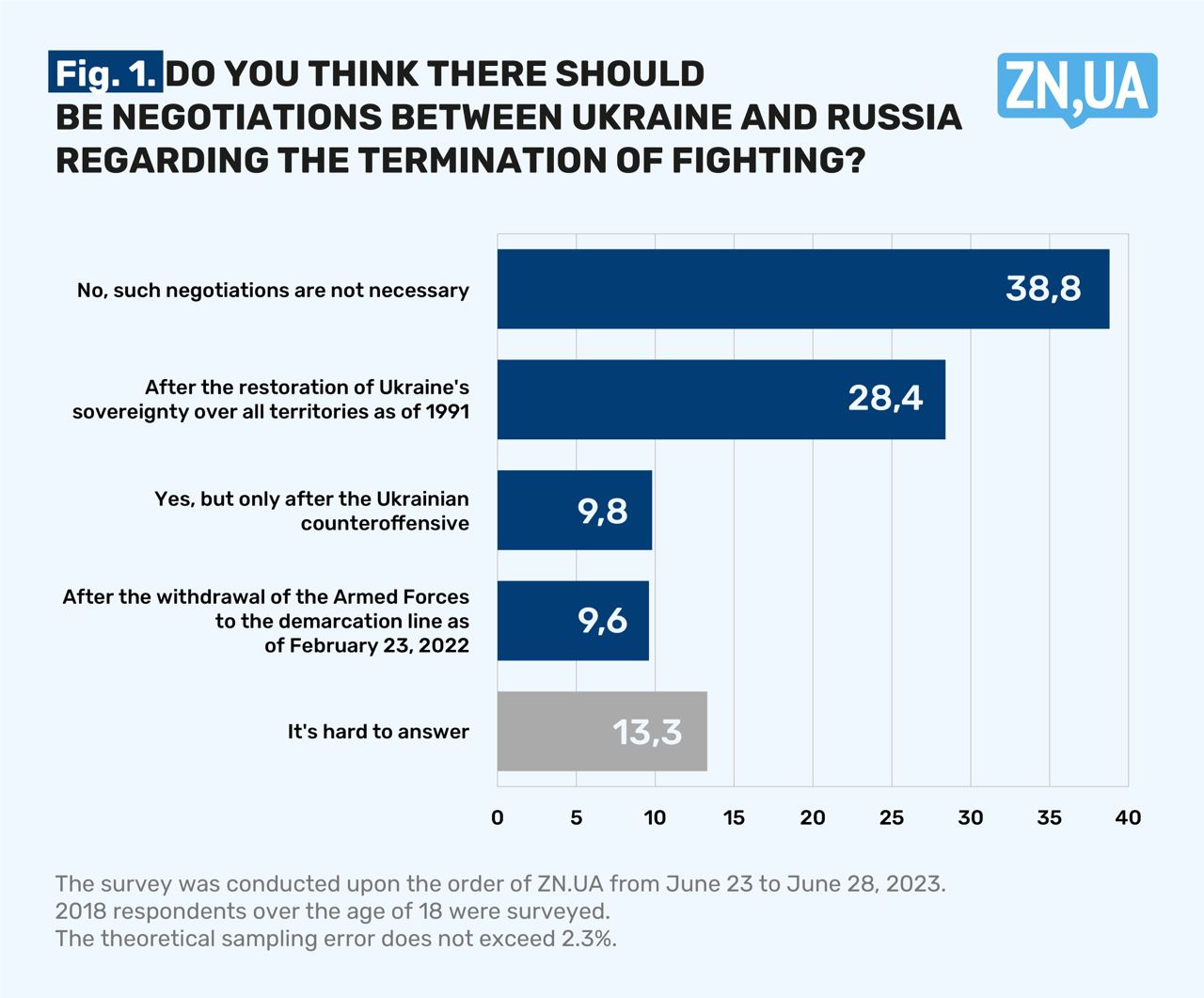
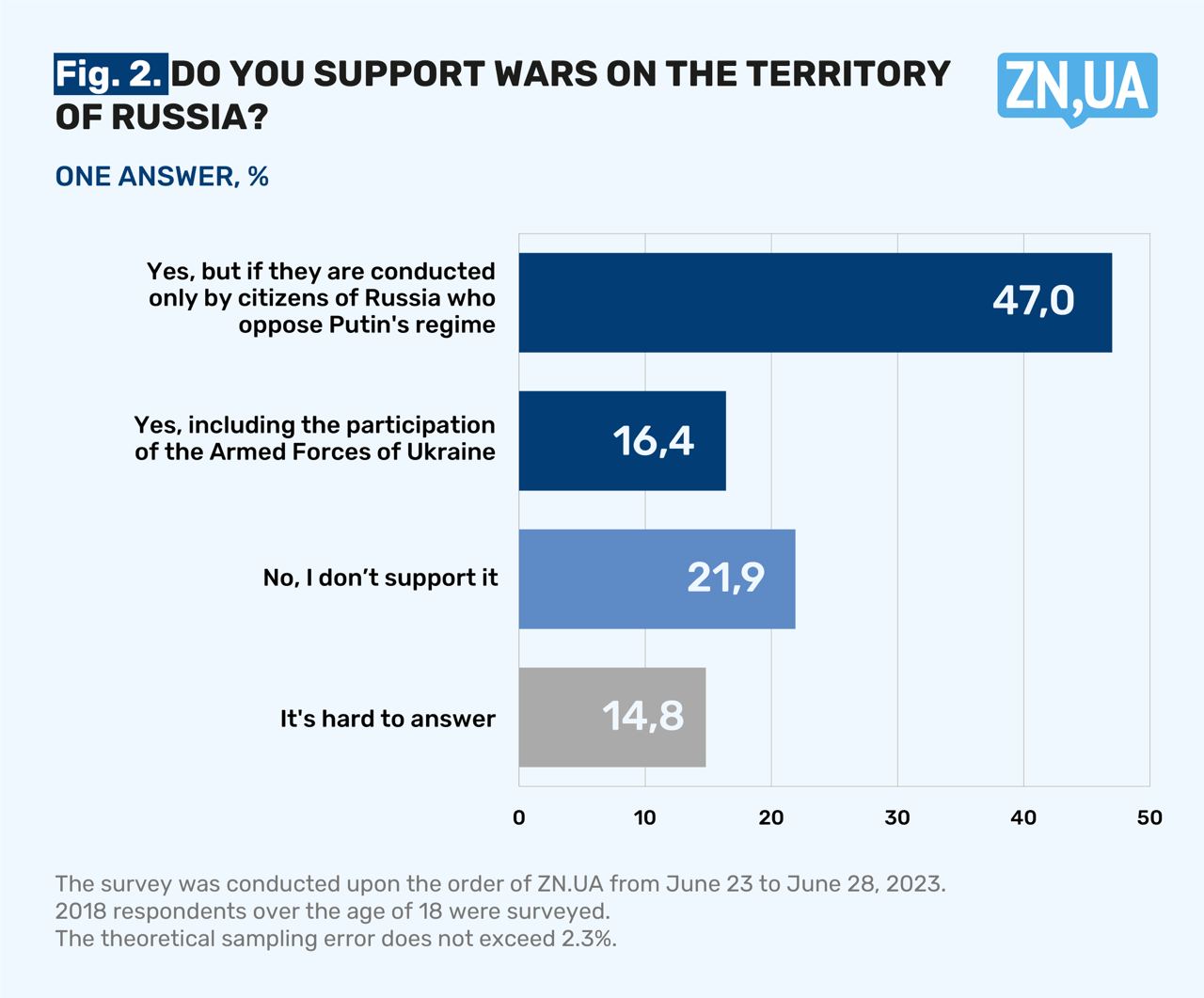
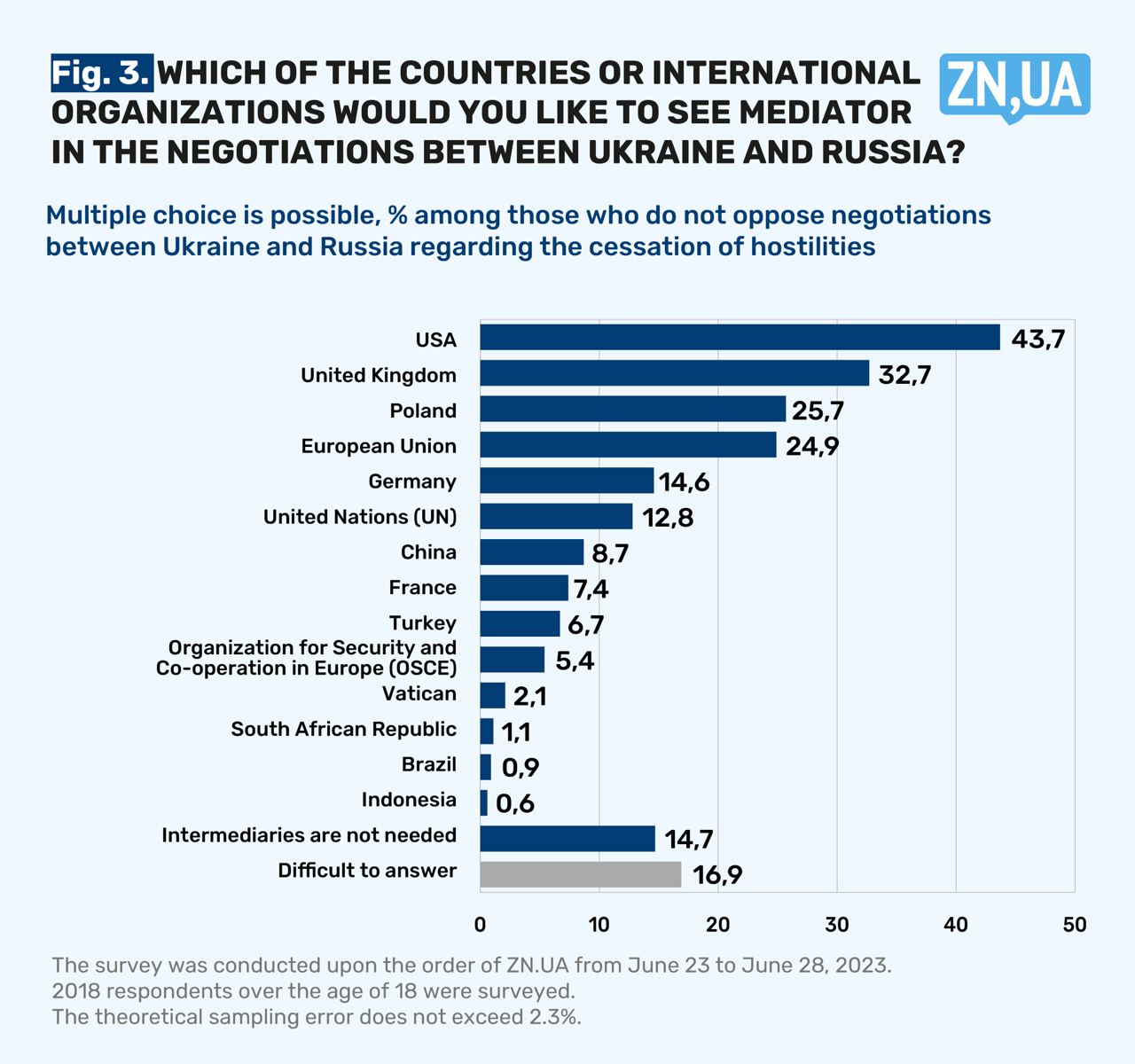
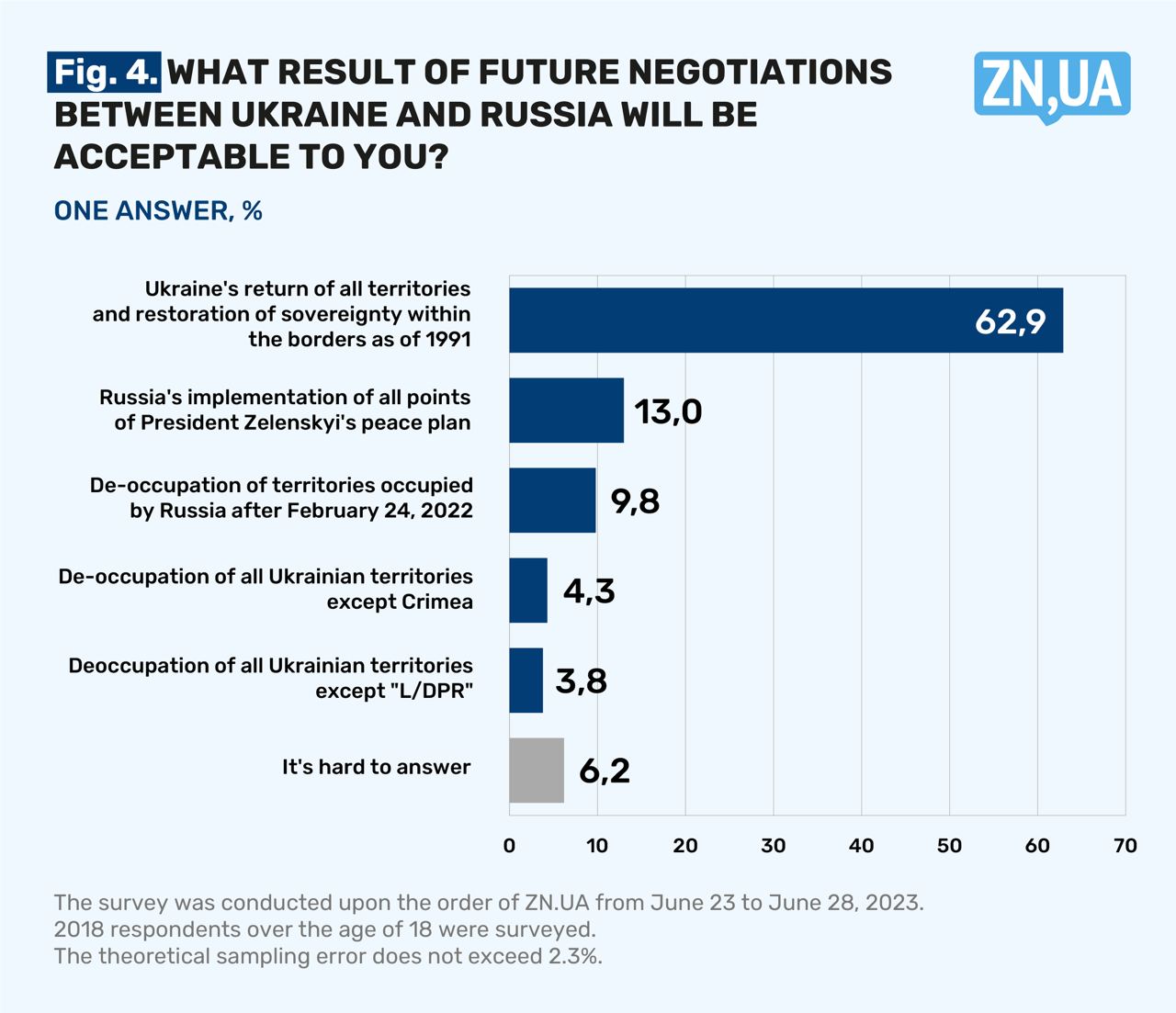
 Login with Google
Login with Google